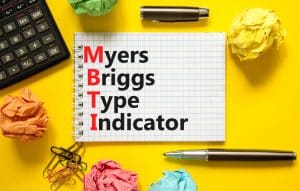MBTI Types: Choosing Your College Major and Career Path
What Does MBTI Mean?
What does MBTI mean? MBTI stands for Myers-Briggs Type Indicator, a personality assessment tool created by Katharine Briggs and her daughter Isabel Myers. The MBTI has become a popular tool for understanding personality differences and preferences.
The tool is based on the work of the Swiss psychiatrist Carl Jung, who suggested four basic psychological functions: sensing/sensation, intuition, feeling, and thinking. These functions are then combined to form 16 possible personality types, which are identified by four-letter codes.
The MBTI assessment consists of a series of questions that ask individuals to consider how they typically think, feel, and behave in certain situations. The questions are designed to measure a person’s preferences in four different areas:
- Extraversion vs. Introversion: This dimension measures how individuals gain energy, and whether they prefer to focus their attention on the external world (extraverts) or the internal world (introverts).
- Sensing vs. Intuition: This dimension measures how individuals gather information and whether they prefer to focus on concrete, sensory details (sensors) or abstract, conceptual possibilities (intuitives).
- Thinking vs. Feeling: This dimension measures how individuals make decisions and whether they prefer to use objective, logical analysis (thinkers) or subjective, empathetic consideration (feelers).
- Judging vs. Perceiving: This dimension measures how individuals approach the external world and whether they prefer to live in a structured, organized way (judgers) or a more flexible, spontaneous way (perceivers).
After completing the assessment, individuals are given a four-letter type code representing their preferences in each area. For example, someone who is an extravert, intuitive, feeler, and perceiver would have the type code ENFP.
The MBTI has been used in a variety of settings, including personal development, team building, career counseling, and relationship counseling. People find the tool to be very helpful in gaining self-awareness and understanding their own strengths and weaknesses, as well as those of others.
Do Colleges Use MBTI?
The Myers-Briggs Type Indicator (MBTI) is a popular personality assessment tool that is widely used in various fields, including personal development, career counseling, and team building. One common question that many students have is, “Do colleges use MBTI?”
In terms of admissions process, most colleges do not use MBTI. Admissions decisions are typically based on factors such as academic performance, extracurricular activities, essays, and letters of recommendation. Personality assessments like the MBTI are not typically part of the evaluation process.
However, some colleges may offer resources related to the MBTI and other personality assessments to their students. For example, career counseling services may use the MBTI as a tool to help students explore their strengths, interests, and career options. The instrument is also used in classes taught by numerous universities’ Psychology and Business departments.
Additionally, some colleges may offer workshops or seminars related to personality assessment and development.
Many students find MBTI and other personality assessments to be helpful in gaining self-awareness and understanding their own strengths and weaknesses. However, it is essential to bear in mind that personality evaluations are just one tool among many that can be used to explore various professional paths and possibilities for one’s own personal growth and development.
Why Is It Important to Know Your MBTI Personality When Choosing Your Course in College?
Choosing the right course in college can be a difficult task, and many students may feel overwhelmed by the options available to them. One tool that can be helpful in making this decision is the Myers-Briggs Type Indicator (MBTI).
Now, why is it important to know your MBTI personality when choosing your course in college? Understanding your MBTI personality type can provide valuable insights into your strengths, preferences, and potential career paths.
Knowing your MBTI personality type can help you identify your strengths and weaknesses. For example, if you are an introverted thinker (INTP), you may excel in logical analysis and problem-solving but struggle with interpersonal communication. Understanding these strengths and weaknesses can help you choose a course that plays to your strengths and allows you to develop your weaker areas.
Secondly, the MBTI can help you identify potential career paths that align with your personality type. Each of the 16 personality types is associated with different career paths and work environments. For example, individuals who are extraverted and enjoy working with people may be well-suited for careers in sales or public relations, while introverted thinkers may prefer more solitary work such as research or computer programming.
Additionally, knowing your MBTI personality type can help you find a college environment that is a good fit for you. Different colleges have different cultures and learning environments, and some may be better suited to certain personality types than others. For example, an introverted individual may prefer a smaller, more intimate college environment, while an extravert may thrive in a larger, more social setting.
While the MBTI can be a helpful tool in choosing a college course, it should not be the only factor you consider. Other important factors to consider include your interests, values, and goals. It is also important to keep in mind that no single assessment tool can fully capture the complexity of human personality, and that your MBTI type is not necessarily a definitive reflection of who you are.
Best Majors for Different Myers-Briggs Types
Choosing a college major is a significant decision that can shape a student’s academic and professional path. Various factors are considered when choosing a major including personal interests and aptitudes, academic and career goals, and the current job market.
The Myers-Briggs Type Indicator (MBTI) is a personality assessment tool that identifies an individual’s preferences and tendencies in four key areas:
- Extraversion vs. Introversion
- Sensing vs. Intuition
- Thinking vs. Feeling
- Judging vs. Perceiving
Each of the 16 MBTI types has unique strengths and preferences that can be well-suited for certain academic majors and career paths.
Let’s look into some of the best majors for different Myers-Briggs types.
ISTJ – Accounting, Business Administration, or Criminal Justice
ISTJs are analytical and logical individuals who prefer to work in structured environments. They are excellent at organizing data and following established procedures. Accounting, business administration, and criminal justice are great majors for ISTJs, as these fields require attention to detail, critical thinking skills, and adherence to protocols.
ISFJ – Education, Nursing, or Social Work
ISFJs are warm, compassionate, and empathetic individuals who enjoy helping others. They are detail-oriented and practical and prefer to work in structured environments. Education, nursing, and social work are excellent majors for ISFJs, as these fields involve working with people and require a high degree of empathy and attention to detail.
ESTJ – Business Administration or Management
ESTJs are natural leaders who thrive in structured environments. They enjoy working with others and are often described as assertive and decisive. A major in business administration or management may be a great fit for ESTJs, as these fields require strong leadership skills and a knack for making decisions.
ESFJ – Nursing or Social Work
ESFJs are known for their compassion and empathy for others. They enjoy helping others and have excellent communication skills. A major in nursing or social work may be a great fit for ESFJs, as these fields allow them to work closely with individuals and make a difference in their lives.
ISTP – Architecture, Sports Management, or Physical Therapy
ISTPs are practical and analytical individuals who enjoy working with their hands. They are skilled at problem-solving and are often drawn to careers in sports, engineering, and construction. Architecture, sports management, and physical therapy are great majors for ISTPs, as these fields require technical skills, problem-solving abilities, and physical dexterity.
ISFP – Fine Arts, Interior Design, or Fashion Design
ISFPs are artistic and creative individuals who enjoy expressing themselves through various forms of art. They are intuitive and empathetic and often have a strong sense of aesthetics. Fine arts, interior design, and fashion design are great majors for ISFPs, as these fields involve creativity, self-expression, and attention to detail.
ESTP – Sports Management or Exercise Science
ESTPs are known for their love of adventure and excitement. They enjoy living in the moment and taking risks. Sports management or exercise science may be the best majors for ESTPs as they allow them to pursue their passion for physical activity and sports while also developing strong leadership and management skills.
ESFP – Performing Arts or Communications
ESFPs are known for their love of excitement and their ability to captivate an audience. They enjoy being the center of attention and have excellent communication skills. A major in performing arts or communications may be a great fit for ESFPs, as these fields allow them to express themselves creatively and engage with others.
INFJ – Psychology, Sociology, or English
INFJs are idealistic and creative individuals who are often drawn to careers that involve helping others. They are insightful and intuitive and have a keen sense of empathy. Psychology, Sociology, and English are great majors for INFJs, as these fields involve analyzing and understanding human behavior and emotions.
INFP – Writing, Journalism, or Social Sciences
INFPs are idealistic and creative individuals who are often drawn to careers that involve helping others. They are insightful and intuitive and have a strong sense of empathy. Writing, journalism, and social sciences are excellent majors for INFPs, as these fields involve analyzing and understanding human behavior and emotions.
ENFJ – Psychology or Counseling
ENFJs are natural caregivers who are excellent at understanding the emotions and needs of others. They enjoy working with people and are skilled at communication. A major in psychology or counseling may be a great fit for ENFJs, as these fields allow them to use their natural talents to help others.
ENFP – Marketing or Advertising
ENFPs are known for their creativity and their ability to see the big picture. They enjoy working with others and have excellent communication skills. A major in marketing or advertising may be a great fit for ENFPs, as these fields require creative thinking and the ability to understand and connect with others.
INTJ – Computer Science, Mathematics, or Law
INTJs are analytical and logical individuals who are often drawn to careers in science, technology, engineering, and mathematics (STEM). They are strategic thinkers who are excellent at problem-solving and abstract reasoning. Computer science, mathematics, and law are excellent majors for INTJs, as these fields require analytical skills and offer opportunities for innovation and advancement.
INTP – Marketing, Engineering, or Computer Science
INTPs are creative and enthusiastic, taking pride in their ability to see the big picture and devise new, better ways to do things. They excel in majors such as Marketing, Engineering, or Computer Science, where they can explore complex ideas and concepts.
ENTJ – Political Science or Law
ENTJs are natural-born leaders who enjoy challenging themselves and others. They have strong analytical skills and are often described as strategic thinkers. A major in political science or law may be a great fit for ENTJs, as these fields require critical thinking skills and a deep understanding of the law.
ENTP – Marketing or Advertising
ENTPs are known for their love of debate and intellectual challenge. They enjoy exploring new ideas and solving complex problems. Marketing or advertising may be the best majors for ENTPs as they allow them to use their strong communication and analytical skills to develop effective marketing strategies and campaigns.
By understanding one’s MBTI type, it’s possible to find a major that aligns with one’s strengths and interests. While these suggested majors are not definitive, they can provide a starting point for individuals looking to pursue a degree that aligns with their personality type.
Again, it’s important to note that these are just general recommendations and that each person is unique and should choose a major that aligns with their own interests, values, and strengths.
How Does MBTI Help in Career Development?
How does MBTI help in career development? Career development is a complex and multifaceted process that involves a variety of factors, including education, skills, experience, and personal preferences. One tool that has been widely used to help individuals understand their personality and career preferences is the Myers-Briggs Type Indicator (MBTI).
Understanding personality types can help individuals make informed decisions about their career paths. For example, introverts may prefer careers that allow them to work independently, while extroverts may thrive in roles that involve more social interaction.
Similarly, individuals who prefer intuition may be more creative and enjoy careers that involve problem-solving, while those who prefer sensing may be more detail-oriented and excel in roles that require precision and accuracy.
Moreover, knowing one’s personality type can help individuals identify their strengths and weaknesses. For instance, those who prefer feeling may be better at empathizing with others and may excel in roles that involve interpersonal communication. On the other hand, those who prefer thinking may be more analytical and may thrive in roles that require data analysis and strategic planning.
MBTI can also provide insights into how individuals approach work and what motivates them. Individuals who prefer judging may be more goal-oriented and may excel in roles that involve meeting deadlines and achieving objectives. Meanwhile, those who prefer perceiving may be more adaptable and creative, which could be valuable in roles that require problem-solving and innovation.
Finally, the MBTI can help individuals better understand how they communicate with others. Individuals who prefer extraversion may prefer face-to-face communication, while introverts may prefer written communication. Similarly, those who prefer thinking may prefer a logical and analytical approach to communication, while those who prefer feeling may prefer a more empathetic and relational approach.
In conclusion, while the MBTI is not a definitive predictor of career success, it can be a useful tool for individuals who are trying to understand their personality and career preferences. However, it’s important to note that personality type is just one factor in career development.
Taking a holistic approach to career development and using various resources and assessments would be more effective and helpful in making decisions about your future. By leveraging the insights gained from the MBTI and combining them with other tools and resources, individuals can better understand themselves and their career path.
If you want to explore your personality type, consider taking the MBTI assessment and discussing the results with a qualified professional.
Aside from professional counseling for your MBTI assessment, learning about college admissions and preparation for college applications are also crucial. If you want expert’s advice and guidance regarding college admissions, you can contact admissions experts like AdmissionSight.
At AdmissionSight, we help students prepare for college and build a strong application profile to increase their chances of getting into prestigious schools in the country. Book an appointment for an initial consultation today to discuss with our admissions experts.










































